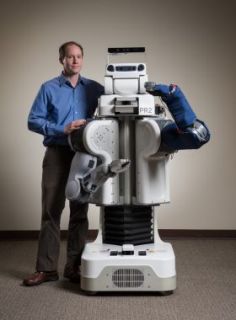Nov 26 2014
Ten years ago, Evans suffered a stroke that left him with limited mobility. Over the past two years, he’s been working with Kemp, an associate professor in the Wallace H. Coulter Department of Biomedical Engineering at Georgia Tech and Emory University, to develop and test robots that help him shave, adjust a blanket when he’s cold, and even scratch an annoying itch.
 The blue cover on the arm of this robot protects an array of sensors that help it reach through the clutter of a typical home to perform personal care tasks. Charlie Kemp poses with the robot, which also holds an electric shaver. (Credit: Rob Felt)
The blue cover on the arm of this robot protects an array of sensors that help it reach through the clutter of a typical home to perform personal care tasks. Charlie Kemp poses with the robot, which also holds an electric shaver. (Credit: Rob Felt)
“We did things with the robots that I never could have imagined,” said Evans, who contacted Kemp after seeing him on a CNN broadcast about health care robots.
Robots working directly with people – even helping them shave – is both challenging and unusual. Most robots today work in manufacturing facilities where, for safety reasons, they stay far away from humans. But Georgia Tech robotics researchers believe people and robots can accomplish much more by working together – as long as the robots have common sense to know, for instance, how much force humans apply when shaving.
“A major challenge for health care robots is that they lack so much of the knowledge and experience that people take for granted,” said Kemp. “To us, it’s just common sense that everybody has; for robots, it’s a serious impediment.”
Giving robots common sense is just one milestone on the path to the kinds of collaboration that will be required to meet the needs of a growing population of older persons. Beyond personal care, the benefits of co-robotics are many. To produce better products more efficiently, manufacturing robots will need to team up with humans, each contributing unique abilities. And in defense and homeland security, robots will increasingly have to take on the dangerous jobs, leveraging people’s skills while protecting them from harm.
Source: http://www.gatech.edu/